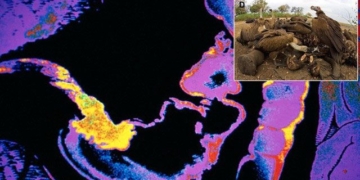Extracting “white gold” is considered one of the most dangerous and arduous jobs.
The world is filled with various dangerous jobs such as coal mining, stone quarrying, window cleaning on skyscrapers, and snake venom extraction. These are among the most perilous jobs globally, seemingly reserved for the brave and those with high endurance.
There are many reasons why someone might dare to risk their life in such hazardous work. It could be for survival, or it might stem from a desire to earn a substantial income.
One of the most dangerous and high-pressure jobs in the world is salt mining in Ethiopia – a country in Africa. The workers devote their entire lives to make a living. They trade sweat, tears, and even their lives to extract a mineral known as “white gold.”

Salt miners in Ethiopia
The Danakil Depression in the Danakil Desert of Ethiopia is regarded as the hottest place on Earth. This desert is part of the Afar Triangle, lying about 100 meters below sea level and contains abundant red rocks, sulfur ore, and salt deposits.
In this depression lives the Afar people. Here, salt is equivalent to currency since the economy relies heavily on salt mining and trading. Approximately 750 salt miners are permitted to work in this area. They extract salt using rudimentary tools such as hammers and picks.
The local economy is relatively backward, primarily consisting of manual labor with little modern machinery to assist. There are no pneumatic drills or specialized mining equipment; workers must use basic tools to break the salt off the ground.
In stark contrast to the wealthy mine owners, the laborers live in poverty. They work hard, but their wages are meager and do not reflect the labor they put in.
Moreover, they must work daily under extreme weather conditions. Temperatures rarely drop below 50 to 60 degrees Celsius, even in the early morning. Therefore, they often have to start their workday early before the sun makes the heat unbearable. This is a challenging job even in milder climates.
Additionally, salt mining is also a highly dangerous job. Due to the rugged terrain, workers must climb over mountains and ravines while transporting salt. Each day, they walk about two hours to reach the salt lakes. Moving in the scorching sun is not an easy task.
Due to economic constraints, the miners do not have any professional protective gear. They can only use bags to prevent salt from entering their nostrils. Their eyes often appear red due to salt irritation, which significantly reduces their vision in a short period.

Their skin is eroded by adhering white salt.
In Africa, clean water is extremely scarce and valuable. As a result, salt miners cannot bathe to clean themselves after a day’s work. This causes their dark skin to gradually turn pale due to the adherence and corrosion of salt.
After working in the salt lakes for about three years, most miners show abnormal signs in their ears and eyes. Many even lose their ability to hear and see. Their skin becomes itchy and irritated, leading to numerous skin wounds that can easily become infected.
Despite the life-threatening nature of salt mining, many locals cling to this profession for their livelihoods.




















































